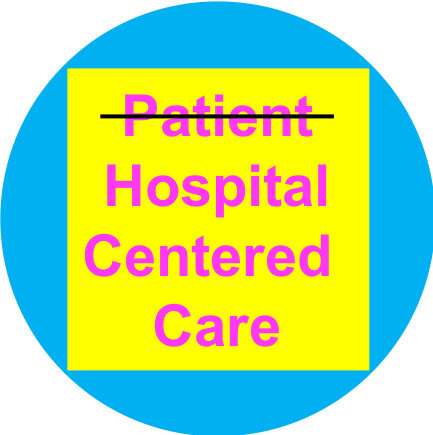Tag: costs
Hospital centered care
 Healthcare decisions are increasingly driven by efficiency and economic factors, even at the end of life. This was brought home to me several months ago with my mother’s death after a short hospitalization for a lung infection.
Healthcare decisions are increasingly driven by efficiency and economic factors, even at the end of life. This was brought home to me several months ago with my mother’s death after a short hospitalization for a lung infection.
Because I was planning to be on vacation during the time of her hospitalization, I was able to be at her side pretty much full time, allowing me a front row seat to a series of decisions that were based on efficiency and hospital reputation rather than patient care.
Follow the money
 A few days after my success getting insurance coverage for a 3-month supply of my daughter’s specialty medication, I learned that my husband’s employer was switching to a new specialty pharmacy. This meant that a new organization was now handling all the logistics of getting the drug to may daughter – the paper work, the shipping, collecting of co-pays, etc.
A few days after my success getting insurance coverage for a 3-month supply of my daughter’s specialty medication, I learned that my husband’s employer was switching to a new specialty pharmacy. This meant that a new organization was now handling all the logistics of getting the drug to may daughter – the paper work, the shipping, collecting of co-pays, etc.
While this was very frustrating news, it was not surprising. Specialty drug spending has increased dramatically in recent years. While there is no standard definition of specialty drugs, these are the high-priced drugs (> $600/month) that are often given by injection and are used to treat serious inflammatory conditions (like rheumatoid arthritis or Crohn’s disease), infections (like HIV and hepatitis C) and many types of cancer. These drugs are often amazing – they save lives and improve symptoms in people who would have suffered greatly in the past. Sadly, companies are competing to make money from these high-priced drugs.
It is easy to blame drug companies for the high price of specialty drugs but they are not the only ones who make money on these drugs.
Our insurance mess
 A few months ago, I read the horrifying story in the New York Times written by a physician, Aaron Carroll entitled “Trapped in the System: A Sick Doctor’s Story”, about how difficult it was for him to get his prescription filled. At the time I joked with my husband that the story didn’t sound that bad to me. My daughter has been taking “specialty drugs” (expensive drugs that are used to treat complicated medical problems like cancer, rheumatoid arthritis and multiple sclerosis) for several years and we have had many frustrating experiences, especially trying to figure out the medical bills. Her recent switch to a new specialty drug has caused the biggest problems yet.
A few months ago, I read the horrifying story in the New York Times written by a physician, Aaron Carroll entitled “Trapped in the System: A Sick Doctor’s Story”, about how difficult it was for him to get his prescription filled. At the time I joked with my husband that the story didn’t sound that bad to me. My daughter has been taking “specialty drugs” (expensive drugs that are used to treat complicated medical problems like cancer, rheumatoid arthritis and multiple sclerosis) for several years and we have had many frustrating experiences, especially trying to figure out the medical bills. Her recent switch to a new specialty drug has caused the biggest problems yet.
Most insurance plans use other companies, called pharmacy benefit managers or PBMs, to manage prescription drugs. And PBMs use companies called “specialty pharmacies” (often owned by them) to manage specialty drugs, which are a key factor in driving up healthcare costs.
Health is life
When I was an infectious diseases specialist, most of the patients I saw were hospital inpatients but I also saw a few outpatients. They came to see me because of weeks or months of symptoms that their doctors couldn’t figure out and were often worried that they had a mysterious infection that was hard to diagnose. All of these patients had real symptoms – they were extremely tired, had headaches, muscle pains and sore throats. They generally arrived with stacks of medical records – numerous lab tests and notes from other doctors. I also noticed that many of them had serious “real life” problems – bad marriages, difficulties at work, housing problems, sick relatives and more. Perhaps they really did have an infection that I couldn’t find but I also began to wonder if their symptoms were caused by the stress.
My intuition was that many of these patients would benefit from speaking with a social worker, marriage counselor, psychologist, an expert in finding affordable housing or a financial planner. Unfortunately, these services were not part of our health care system. I suspected that many of my patients would get better if we were able to treat the whole patient, not just the symptoms.
Paying patients for their expertise
 Thanks to the work of organizations like the Society for Participatory Medicine and patient advocates like e-patient Dave, the voice of the patient is being heard. And I’ve written before about organizations like the ImproveCareNow network where patients and families are treated as equal partners in quality improvement efforts.
Thanks to the work of organizations like the Society for Participatory Medicine and patient advocates like e-patient Dave, the voice of the patient is being heard. And I’ve written before about organizations like the ImproveCareNow network where patients and families are treated as equal partners in quality improvement efforts.
I love that patients and families are being recognized for their expertise and that healthcare organizations are starting to involve patients as team members from the beginning of projects. I also love that organizations like PCORI (Patient Centered Outcomes Research Institute) are recognizing the importance of asking patients the research questions and outcomes that are most important to them.
So this is all really good, right? Yes, but…
Are we in Belarus?
 I spent much of last week trying to sort out the bills for the medication my daughter receives by infusion every 2 months. I’ve written before about the facility fees that many hospitals charge patients to inflate their bills and about how hospital bills are impossible for patients to understand. Because the facility fees doubled our out-of-pocket expenses, we applied to a program run by the pharmaceutical company, that reimburses patients for up to $6000 per year for drug costs.
I spent much of last week trying to sort out the bills for the medication my daughter receives by infusion every 2 months. I’ve written before about the facility fees that many hospitals charge patients to inflate their bills and about how hospital bills are impossible for patients to understand. Because the facility fees doubled our out-of-pocket expenses, we applied to a program run by the pharmaceutical company, that reimburses patients for up to $6000 per year for drug costs.
The drug company program requires that the patient send copies of the Explanation of Benefits (EOB) from the insurance company along with the bill from the hospital after each infusion. Unfortunately, neither the insurance company nor the hospital includes the name of the drug in their paperwork so the reimbursement was denied by the drug company. After many attempts I was able to get an itemized bill from the hospital (although they made it clear that I would have to call each time I needed one in the future). The reimbursement for one infusion was finally issued – but it was put on a Mastercard that could only be used for payment of future infusions. After many weeks, I finally found a person in the infusion center who agreed to help me figure out how to spend the money that was already on the Mastercard.
Making patients pay more
Medical bills are not designed to make sense to the patient. In fact, as I’ve written before, they are almost impossible to understand, even when the charges are explained by the billing office.
So it’s pretty easy for hospitals to add charges to the bill without the patient really knowing. One popular way is to add a “facility fee”.
My daughter in on a medication that is given once every 2 months. She goes to the doctors’ office building that is connected to an academic medical center where the medication is given through an IV over the course of a few hours. The staff members in the infusion center know her well and her doctor often stops by to say hello while she is there.
Patient centered billing
 My husband and I returned from a weekend away to find a message on our answering machine saying that we owed money to the hospital and that if we didn’t pay it within 10 days, they would send the bill to a collection agency. The message was left on Saturday night and the automated voice said the charges were for cardiology services for our daughter.
My husband and I returned from a weekend away to find a message on our answering machine saying that we owed money to the hospital and that if we didn’t pay it within 10 days, they would send the bill to a collection agency. The message was left on Saturday night and the automated voice said the charges were for cardiology services for our daughter.
Our initial thought was that this was a mistake because: 1) our daughter had not been seen by a cardiologist and 2) we have paid all our bills.
